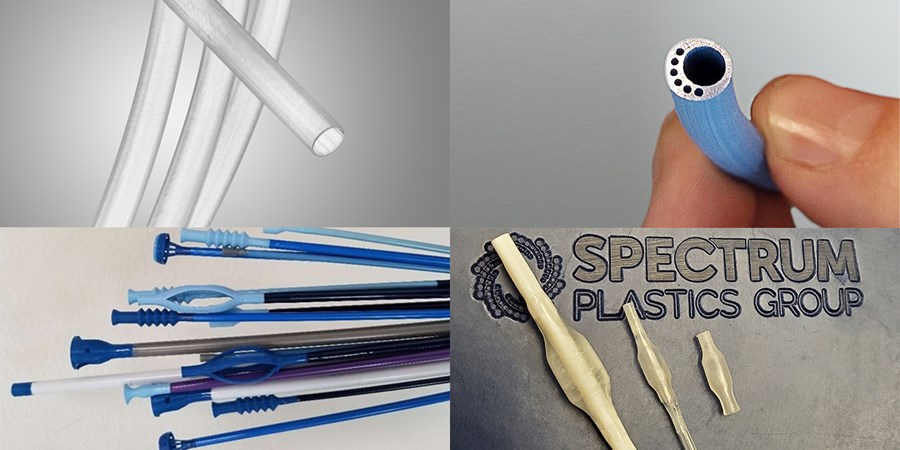


Spectrum Invests in Advanced Additive Manufacturing Capabilities

Spectrum Plastics Group, a global solutions provider for development through scaled manufacturing of critical polymer-based components and devices for medical and other demanding markets, continues to invest in advanced additive manufacturing (AM) to expand its portfolio of capabilities that support all stages of the development process.
AM allows engineers and designers to create lighter and stronger products from highly engineered materials, including a wide range of thermoplastic resins. Spectrum’s proprietary processes, equipment, and USP Class VI and/or ISO 10993 materials can be customized for a wide range of medical applications, with submicron tolerances. For example, Spectrum has developed its own medical-grade filaments that easily match commonly used customer materials, such as engineered or exotic resins including PEEK, thermoplastic elastomers (TPEs), glass-filled polymers, and bioresorbable compounds. Because these are manufactured in-house to exact specifications, these filaments ensure the highest quality, control, availability, and speed. Using the medical-grade filament, Spectrum’s advanced AM technologies can create components for medical devices, such catheter tip and hubs, micro parts, custom profiles, handles, and tubing.
Spectrum’s advanced AM capabilities can also produce parts without the cost and lead time of tooling common to traditional precision manufacturing methods. Specifically, Spectrum has developed a unique proprietary process that uses AM instead of extrusion to manufacture single and multilumen profile tubing, with very tight tolerances—a first in the industry.
”Multilumen tubing using our additive manufacturing program is pushing the limits of AM in terms of design, materials, and speed,” said Tyler Stark, senior director of additive manufacturing and innovation for Spectrum at its Sandy, Utah facility. “This groundbreaking AM technology allows us to turn out a full-length multilumen tube to exact specifications in a single day. In an extrusion process, it can take up to three or more die iterations and weeks before nailing down a prototype multilumen extrusion. With our new technology, we simply print the entire extrusion profile out of the first shot of designated material—something traditional processes cannot do.”
Spectrum can make AM prototypes from the exact same materials that would be used in production-ready products such as tubing and catheters, saving time and materials by reducing the number of iterations. In addition, this minimizes the variation that is typically introduced between early-stage prototyping and final production-representative components required for design verification testing. This is especially beneficial for prototypes with varying durometers, such as in certain formulated elastomer parts. Another capability—bridge manufacturing—utilizes AM to test low-volume production runs of a product before investing heavily in a mass-production process using standard methods of manufacturing, like injection molding and extrusion.
Bringing a medical device to market can take years and requires deep expertise in identifying product requirements and the best product design to meet clinical needs. Spectrum’s AM capabilities allow medical-device designers to select from a wide custom range of medical-grade plastics with specifically engineered material and design characteristics, including multi-material and multi-dimensional builds, to streamline the product development process.
Customers especially value Spectrum’s industry-leading AM capabilities for expanding their design possibilities, accelerating design iterations, shortening lead times, and reducing development costs. “Realistically,” said Stark, “we have not seen a part design that we cannot fabricate with AM. However, not all projects require AM. Sometimes traditional extrusion or injection molding is the fastest and most cost-effective method to make a part; in other cases, AM is the only way to produce a complex part that may enable the success of a next-generation device. When engineers start designing more innovative or multifunctional designs that challenge the limits of conventional manufacturing methods, they realize that AM can be invaluable in turning their ‘impossible’ designs into first-of-kind medical products.”
For more information on AM, or to discuss if AM is a good choice for your next project, please contact us to speak directly with our technical experts.
About Spectrum Plastics Group
Based in Alpharetta, Georgia with a global network of plants across the United States, Mexico, Canada, Costa Rica, Ireland and Malaysia; Spectrum Plastics Group is a leader in development through scaled manufacturing of critical polymer-based components and devices for medical and other demanding markets requiring quality, responsiveness, innovation and technical expertise. With over 2,000 Teammates, 20 locations, and one million square feet of manufacturing space including Class 7 and Class 8 cleanrooms; Spectrum Plastics Group meets the requirements of ISO 9001 and ISO 13485 and has the resources to solve customers’ most challenging problems. For more information, visit www.spectrumplastics.com or call 404-564-8560.